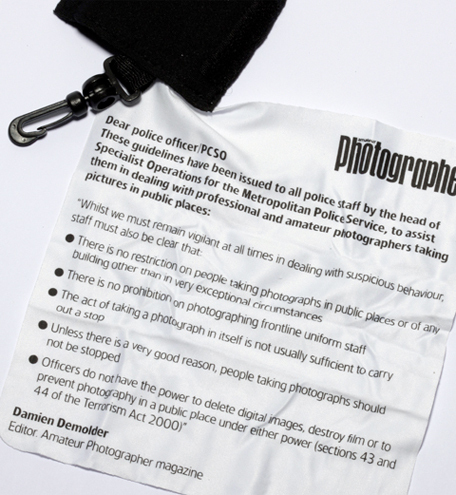
Photographer's Rights. Know What You Can and Can't Photograph While Traveling in the States
by Cody Johnson | Jan 3, 2012 | Advice
This can be a touchy subject. I am extremely grateful for everything our police officers and all first responders do for our community. Ever since 9/11 police have been quicker to stop photographers who are taking photos of public buildings and architecture. I have been stopped on numerous occasions. All the officers that have approached me have been extremely polite and nice. We actually end up talking about photography for about 10 minutes. I show them a few photos I have snapping and they are pleased. The next time you are on vacation (especially in a big city) be aware that if you like to take pictures of important buildings or public spaces you may be approached by a police officer. Be sure you know your rights to photograph in public spaces:
When in public spaces where you are lawfully present you have the right to photograph anything that is in plain view. That includes pictures of federal buildings, transportation facilities, and police. Such photography is a form of public oversight over the government and is important in a free society.
Police officers may not generally confiscate or demand to view your photographs or video without a warrant. If you are arrested, the contents of your phone may be scrutinized by the police, although their constitutional power to do so remains unsettled. In addition, it is possible that courts may approve the seizure of a camera in some circumstances if police have a reasonable, good-faith belief that it contains evidence of a crime by someone other than the police themselves (it is unsettled whether they still need a warrant to view them). (citing: http://www.aclu.org/free-speech/know-your-rights-photographers)
Police may not delete your photographs or video under any circumstances.
Police officers may legitimately order citizens to cease activities that are truly interfering with legitimate law enforcement operations. Be smart and don't get in their way when they are trying to do their job.
When you are on private property, the property owner may set rules about the taking of photographs. - So you better behave yourself and ask for permission if you are on private property. Otherwise you could end up in big trouble. Especially if the owner of the property isn't such a nice guy/girl.
If you are stopped by a police officer. Be polite and courteous. The correct question to ask the officer is, "Am I free to go?" If the answer is "No." then you are being detained, something that under the law an officer cannot do without reasonable suspicion that you have or are about to commit a crime or are in the process of doing so. Until you ask to leave, your being stopped is considered voluntary under the law and is legal. If you are detained, politely ask what crime you are suspected of committing, and remind the officer that taking photographs is your right under the First Amendment and does not constitute reasonable suspicion of criminal activity. (citing: http://www.aclu.org/free-speech/know-your-rights-photographers)
Now with all this said, it is kind of nice to know that the police care enough about our cities to come up and ask why you are photographing a building or public space. I think as long as you are polite with them they will be with you...fingers crossed.
Apparently this got so bad in the UK that a company decided to print out photographer's rights on a lens cleaning cloth...now that is pretty clever. It probably is a good idea to make a copy of your rights and keep them in your camera bag just in case. Best of luck the next time you are out and about taking some beautiful architecture photos!


